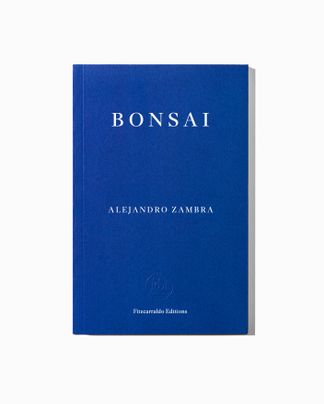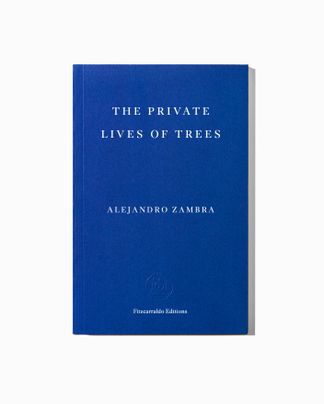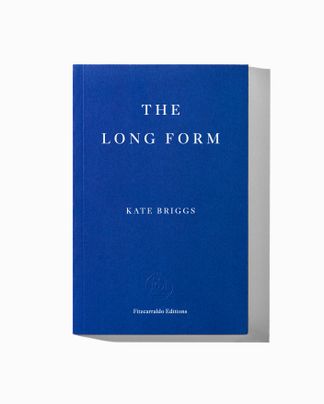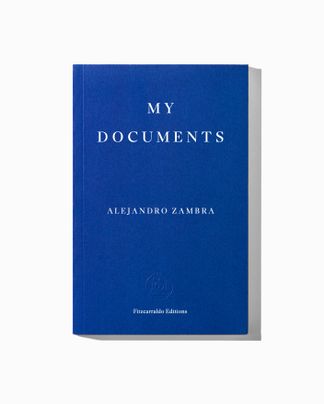How do we write about the singular experience of parenthood? Written in a ‘state of attachment’, or ‘under the influence’ of fatherhood, Childish Literature is an eclectic guide for novice parents, showing how the birth and growth of a child changes not only the present and the future, but also reshapes our perceptions of the past. Shifting from moving dispatches from his son’s first year of existence, to a treatise on ‘football sadness’, to a psychedelic narrative where a man tries, mid-magic mushroom trip, to re-learn the subtle art of crawling, this latest work from Alejandro Zambra shows how children shield adults from despondency, self-absorption and the tyrannies of chronological time. At once a chronicle of fatherhood, a letter to a child and a work of fiction, Childish Literature is the latest, virtuosic addition to the oeuvre of one of the most exciting Latin American writers in recent decades.
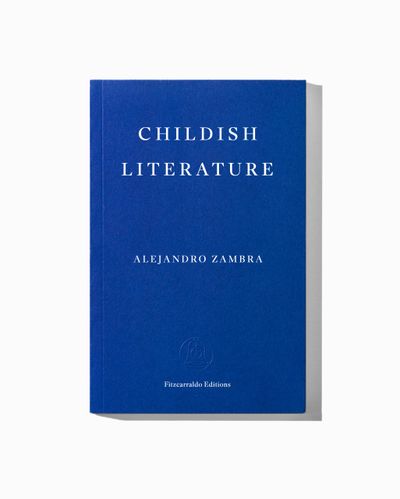
Childish Literature
Translated by Megan McDowell
French paperback with flap, 216 pages
Published 24 October 2024
Childish Literature
Translated by Megan McDowell
CHILDISH LITERATURE
0.
With you in my arms, I see the shadow we cast together on the wall for the first time. You’ve been alive for twenty minutes.
Your mother’s eyelids lower, but she doesn’t want to sleep. She rests her eyes for just a few seconds.
‘Sometimes newborns forget to breathe,’ a friendly buzzkill of a nurse informs us.
I wonder if she says it like that every day. With the same words. With the same sad cautionary tone.
Your little body breathes, though: even in the dimly lit hospital, your breathing is visible. But I want to hear it, hear you, and my own wheezing breath won’t let me. And my noisy heart keeps me from hearing yours.
Throughout the night, every two or three minutes I hold my breath to make sure you’re breathing. It’s such a reasonable superstition, the most reasonable of all: stop breathing so your child will breathe.
1.
I walk through the hospital as though searching for cracks left by the last earthquake. I think horrible thoughts, but I still manage to imagine the scars that someday you will proudly show off towards the end of summer.
14.
Your brief fourteen-day life wears the word childhood like a roomy poncho. But I like how exaggerated it sounds. Fourteen days old – the word old looks so strange there, when you’re still so relentlessly new.
25.
You cry and I show up. What a rip-off. Maybe our fathers took those first rejections too much to heart.
You don’t prefer me, but you get used to my company. And I get used to sleeping when you sleep. The rhythm of intermittent naps reminds me of hundreds of long bus rides dozing on the way to grade school or university, to attend classes where I went right on dozing off. Or those delicious, furtive catnaps that allowed me to endure a working life.
Suddenly, I’m fifteen years old and it’s midnight and I’m studying something that might be chemistry or algebra or phonology and I’m out of cigarettes and it’s a problem, because I smoke a lot in my dreams. I wake up when some shy dogs start their concert of barks and a neighbour starts hammering; perhaps he’s hanging a portrait of his own son on the wall, and that’s why he doesn’t care about waking mine.
But you go on sleeping against my chest, and you seem to be even more deeply asleep, seriously asleep. I have no idea what time it is, and I don’t care. Eleven in the morning, three in the afternoon. That’s how the tired but happy days pass, alternating with the happy but tired days and the happy but happy days.
31.
The birth of a child heralds a far-reaching future in which we will not fully participate. Julio Ramón Ribeyro summed it up well: ‘The tooth that comes in for them is the one that falls out for us; the inch they grow is the one that we shrink; the lights they acquire are the ones extinguished in us; what they learn, we forget; and the year added for them is the one subtracted for us.’
It’s a beautiful thought, whose turbulent side, however, has unhinged millions of men. I’m thinking of fathers from past generations, though it’s ridiculous to presume things have changed. I have met men who practise fatherhood with lucidity, humour and humility, but I have also seen dear friends who seemed to have their hearts well placed turn away from their children to indulge in a desperate and clichéd recovery of their youth. And there are also plenty of fathers who confront the death drive by burdening their kids with missions and commandments, with the explicit or veiled intention of using their children to further their own interrupted dreams.
What I find striking, in any case, is the almost absolute lack of a tradition. Since all human beings – I assume – have been born, it would seem natural for us to be experts in matters of child-rearing, but it turns out that we know very little, especially men, who sometimes seem like those cheerful students who show up to class blissfully unaware that there’s a test. While women passed on to their daughters the asphyxiating imperative of maternity, we grew up pampered and ineffectual and even humming along to ‘Billie Jean’. Our fathers tried, in their own ways, to teach us to be men, but they never taught us to be fathers. And their fathers didn’t teach them either. And so on.
(…)
‘Childish Literature shows boundless – and bounding – enthusiasm for the chaos and curiosity that his son, Silvestre, has brought into his life…. Alejandro Zambra makes being a writer seem like the least solitary, most joyful job in the world – an enthusiasm that makes this his most engaging book yet.’
— Jonathan Gibbs, Times Literary Supplement
‘Zambra is peerless in his sensitive exploration of the condition of fatherhood – the joys, the complications, the surprises – where being a father is less of a given than something to be earned…. Becoming a father teaches Zambra much about what it is to be a writer and a reader. Writing increasingly appears to Zambra as an extension of play, the adult refuge for the imaginative possibilities of childhood…. Zambra’s readers … will not readily forget a work that rescues the extraordinary adventure of fatherhood from the box-ticking dutifulness of parenting manuals.’
— Michael Cronin, Irish Times
‘It represents fatherhood as an emotional and intellectual relationship not just to a child but also to childhood, with all of the growth and exploration and confusion that entails…. It has memoir and fiction, ordinary linear essays and more fragmentary ones. It’s an appealing jumble – as is fatherhood itself … full of quotidian pleasure, and of play…. Zambra’s book doesn’t omit the trials and complications of having children … but no matter how much unease appears in the book, [it] remains affectionate and optimistic, expansive…. It defies not only conventions of literary masculinity but also an entrenched, persistent vision of fatherhood as part of a man’s private rather than public life. Zambra represents fatherhood as a form of participation in society.’
— Lily Meyer, The Atlantic
‘What a rare and wonderful experience, to read a writer of such brilliance, wit and style as Alejandro Zambra on the subjects of fatherhood and childhood. I relished every page of this beautiful, surprising book.’
— Mark O’Connell, author of A Thread of Violence
‘Charming, protean, ebullient and precise, this book transforms and grows almost as much as the parents and child at the centre of the book. A wonder.’
— Karan Mahajan, author of The Association of Small Bombs
‘Hopeful, funny and full of wisdom. A meditation on fatherhood by one of our most perceptive writers.’
— Tara Westover, author of Educated
‘Zambra is one of my favourite living writers (which makes Megan McDowell one of my favourite translators). Childish Literature is funny, playful, sincere and, for me, as a new father, reassuring, not because of parenthood platitudes (quite the opposite), but for its line of anxious questioning on how one fathers a child without a “tradition of fatherhood”. It has clarified some of the depth of love alongside the concerns I have as a new father. Zambra is once again doing the work of great literature, providing (and provoking) old and new ideas around family, education, literature and art. He is childlike and deeply serious about the spaces and times we live in. If you have read this book, let’s talk about it!’
— Raymond Antrobus, author of Signs, Music
‘Whenever Alejandro Zambra brings out a new book, I’m excited to read it. The playful intelligence of his exuberant imagination, along with his sharp-eyed, poignant, poetic observations of everyday life, are unmatched. On every page there’ll be something that makes me laugh out loud, no matter if what’s being narrated is devastating or – like this new book – luminously tender. In Childish Literature, Zambra’s account of fatherhood is so generous, self-deprecating and infectious.’
— Francisco Goldman, author of Monkey Boy
‘Every beat and pattern of being alive becomes revelatory and bright when narrated by Alejandro Zambra. He is a modern wonder.’
— Rivka Galchen, author of Everyone Knows Your Mother is a Witch
‘When I read Zambra I feel like someone’s shooting fireworks inside my head.’
— Valeria Luiselli, author of Lost Children Archive
‘The most talked-about writer to come out of Chile since Bolaño.’
— New York Times
‘Strikingly original.’
— James Wood, New Yorker
‘There have been plenty of books written about the experience of becoming a parent in recent years, but few of them have tackled the subject with the style, wit, wisdom and grace of Alejandro Zambra in his latest book…. Zambra is an exceptionally funny writer, but he’s also much more … and the last chapter of the book, which is a letter to his son both now and in the future, is beautifully moving. Childish Literature is a testament to why Zambra is one of the most exciting writers working today.’
— Joshua Rees, Buzz Magazine
Alejandro Zambra was born in Santiago, Chile, in 1975. He is the author of Chilean Poet, Multiple Choice, Not to Read, My Documents, Ways of Going Home, The Private Lives of Trees and Bonsai. In Chile, among other honours, he has won the National Book Council Award for best novel three times. In English, he has won the English PEN Award and the PEN/O. Henry Prize and was a finalist for the Frank O’Connor International Short Story Award. In 2023 he won the Manuel Rojas Ibero-American Prize for the totality of his oeuvre. He has also won the Prince Claus Award (Holland) and received a Cullman Centre Fellowship from the New York Public Library. His books have been translated into twenty languages and his stories have been published in the New Yorker, New York Times Magazine, Paris Review, Granta, McSweeney’s Quarterly and Harper’s, among other publications. He has taught creative writing and Hispanic literature for fifteen years and currently lives in Mexico City.
Megan McDowell’s translations have won the National Book Award, the English PEN Award, the Premio Valle-Inclán, the Shirley Jackson Award and two O. Henry Prizes, among others, and have been nominated for the International Booker Prize four times. In 2020, she won an American Academy of Arts and Letters Award in Literature. She lives in Santiago, Chile.

